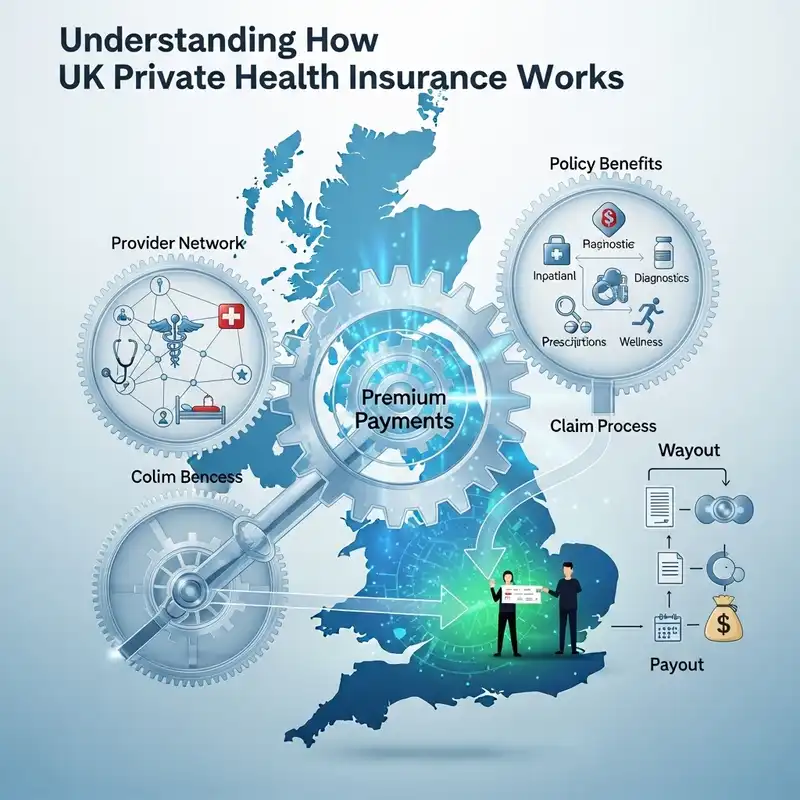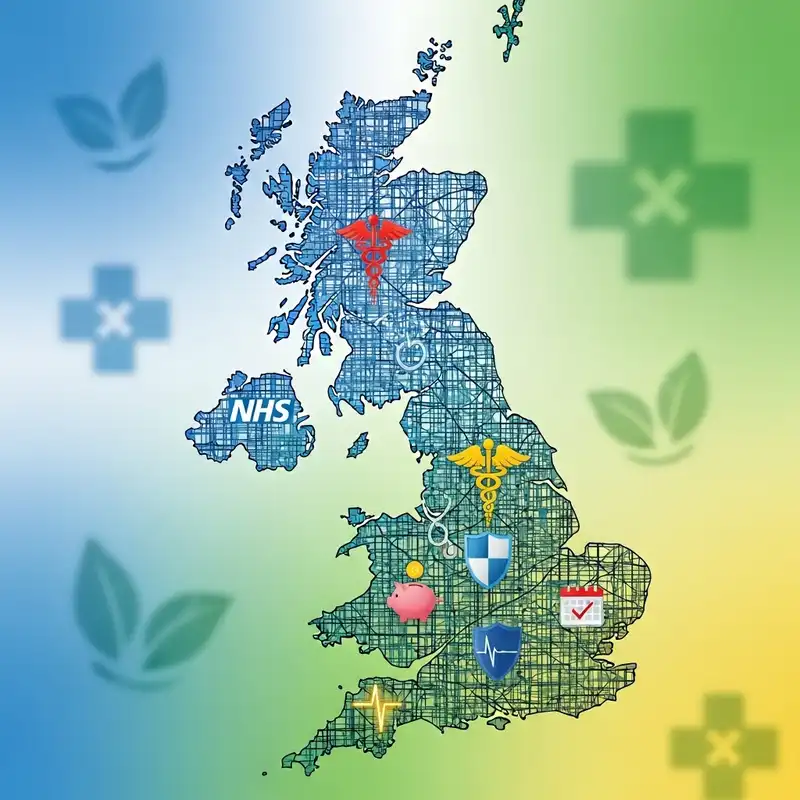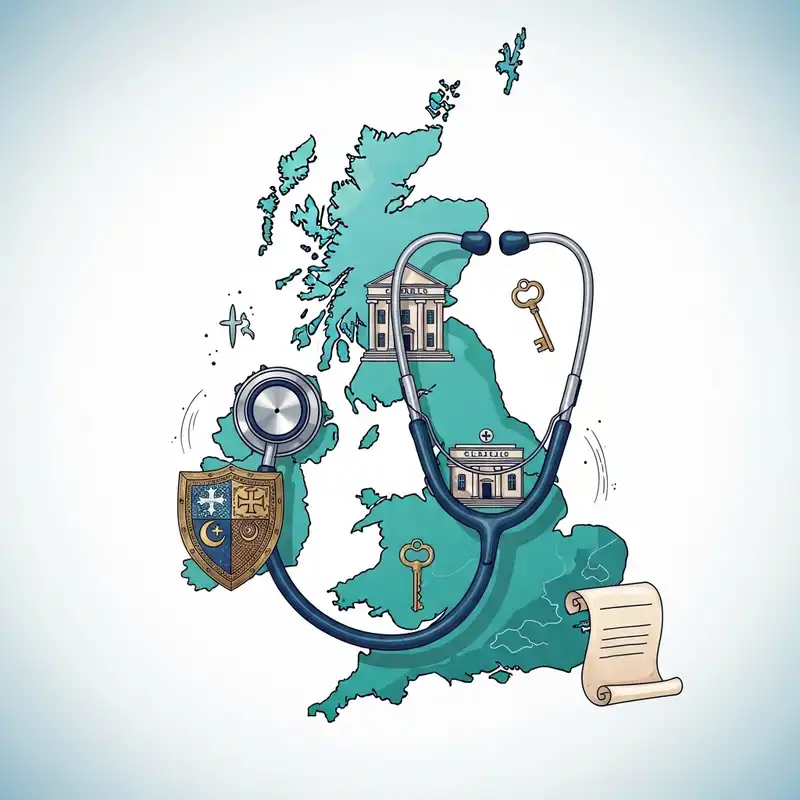TL;DR
Navigating these options can be complex. At WeCovr, we specialise in helping you understand which combination of these tools is right for your unique circumstances. We compare policies from all the UK's leading insurers to build a bespoke fortress that protects you and your ambitions.
Key takeaways
- What it is: A policy that pays out a tax-free lump sum. It typically pays out on either the diagnosis of a specified serious condition (like cancer, heart attack, or stroke) or on death.
- Who it's for: Anyone with a mortgage, dependents, or significant debts. It ensures that your financial obligations do not fall on your family's shoulders.
- The Growth Angle: The power of this cover lies in the options it creates.
- On Critical Illness Diagnosis: The lump sum can be used to clear a mortgage, relieving immense financial pressure. It can pay for private treatment, home modifications, or simply replace lost income, allowing you and your partner to focus 100% on your recovery. This protects the life you've built and gives you the best possible chance to return to it.
- On Death: The payout provides security for your loved ones, ensuring they can stay in the family home, fund their education, and maintain their quality of life. This is the ultimate act of securing your legacy. It guarantees that the growth and prosperity you created for your family continues even after you're gone.
Beyond Self Help Your Future Proofed Life
As projected 2025 health statistics reveal one in two people facing a cancer diagnosis, and economic uncertainty looms, discover why true self-improvement starts with fortifying your foundation. Learn how strategic Family Income Benefit, robust Income Protection, specialized Personal Sick Pay for vital frontline workers and tradespeople, comprehensive Life and Critical Illness Cover, and powerful Gift Inter Vivos aren't mere safety nets, but strategic investments in your continued development. Understand how private health insurance, offering swift access to vital diagnostics and care, ensures rapid recovery, safeguarding your capacity to thrive, build legacy, and achieve a life of purpose, even when the unexpected strikes.
We live in an age of ambition. The shelves—both physical and digital—are overflowing with guides to optimising our lives. We chase productivity hacks, build side hustles, and map out five-year plans, all in the relentless pursuit of personal and professional growth. Yet, in our drive to build upwards, we often neglect the very ground upon which our ambitions stand.
This foundation is our health and our financial stability. And in today's volatile world, that ground is becoming increasingly shaky.
The reality of 2025 is stark. Economic headwinds persist, making financial planning more complex than ever. At the same time, sobering health projections from leading bodies like Cancer Research UK suggest that one in two people in the UK born after 1960 will be diagnosed with some form of cancer in their lifetime. This isn't fear-mongering; it's a statistical reality we must prepare for.
This is where the conversation about self-improvement needs a radical shift. True, sustainable growth isn't just about building new skills or expanding your network. It’s about building a fortress around what matters most: your health, your income, and your family's future. This is not about resilience—the ability to bounce back. This is about proactive fortification—ensuring the bounce is never so damaging in the first place.
This guide will show you how strategic financial and health planning is the ultimate fuel for your growth. We will explore how products like Income Protection, Critical Illness Cover, and Private Medical Insurance are not expenses, but essential investments in your uninterrupted potential. They are the tools that allow you to take risks, build your legacy, and pursue a life of purpose with the confidence that you are protected, no matter what life throws your way.
The Fragility of Our Ambitions in an Unpredictable UK
The modern British professional, entrepreneur, and tradesperson is under immense pressure. The cultural narrative celebrates the 'hustle', the 'grind', and constant self-betterment. But this forward momentum can create a dangerous blind spot to the vulnerabilities that lie beneath the surface.
An unexpected illness, a serious accident, or a sudden downturn in the market can do more than just pause your progress; it can shatter it entirely, wiping out years of hard work and savings.
The Sobering Statistics of Modern Life
Let's look at the facts. These aren't abstract risks; they are quantifiable probabilities that affect millions across the UK.
- The Health Challenge: The "1 in 2" cancer statistic is a powerful headline, but the reality is broader. According to the Office for National Statistics (ONS), in 2023, a record 2.8 million people were on long-term sick leave in the UK. The reasons are varied, from musculoskeletal issues and stress to more severe conditions.
- The Financial Squeeze: Statutory Sick Pay (SSP) in the UK stands at a modest £116.75 per week (for the 2024/25 tax year). It is payable by your employer for up to 28 weeks. For the vast majority of households, this represents a catastrophic drop in income.
- The Self-Employed Gap: For the UK's 4.3 million self-employed individuals, the situation is even more precarious. There is no employer to provide SSP. If you don't work, you don't earn. Period.
Let's put this into perspective.
The Reality Gap: Statutory Support vs. Real Life
The chasm between the state's safety net and the actual cost of living is vast. Consider a typical monthly budget against what SSP provides.
| Expense Category | Average UK Monthly Cost | Monthly Statutory Sick Pay (approx.) | The Monthly Shortfall |
|---|---|---|---|
| Rent/Mortgage | £1,200 | ||
| Utilities & Council Tax | £350 | ||
| Groceries | £400 | £505 | -£1,845 |
| Transport | £200 | ||
| Other Essentials | £200 | ||
| Total Outgoings | £2,350 |
Note: Average costs are illustrative and vary by region and lifestyle.
This table starkly illustrates the problem. A reliance on SSP alone leads to an immediate and unsustainable financial crisis for the average family. Savings are quickly depleted, debts mount, and the stress of managing finances severely hampers any chance of a smooth recovery. Your ambitions to launch a business, save for a deposit, or fund your children's education are not just delayed; they are fundamentally endangered.
More Than a Safety Net: Strategic Insurance as a Growth Enabler
This is why we must reframe our view of protection insurance. It’s not a "grudge purchase" or a pessimistic bet against yourself. It is a strategic, empowering tool that creates the secure environment necessary for growth. By ring-fencing your finances and health, you give yourself the freedom to focus on your ambitions.
Let's break down the key components of this financial fortress.
Income Protection: The Bedrock of Your Financial Stability
Imagine your ability to earn an income is a machine that powers your entire life. Income Protection (IP) is the high-calibre fuel that keeps it running, even if you are medically unable to operate it yourself.
- What it is: A policy that pays out a regular, tax-free monthly income if you are unable to work due to any illness or injury. This can continue until you recover, or until the end of the policy term (often your planned retirement age).
- Who it's for: Every single person who relies on their earned income. It is especially critical for the self-employed, freelancers, contractors, and those in the gig economy who have no access to employer sick pay.
- The Growth Angle: Income Protection is arguably the most important financial product you can own. It eliminates the existential dread of "what if I can't work?". This psychological freedom is a powerful catalyst for growth. You can:
- Take calculated career risks: Consider that freelance contract or start-up venture with confidence.
- Focus entirely on recovery: If you fall ill, your sole job is to get better, not to worry about bills.
- Maintain your lifestyle: Your mortgage, bills, and family commitments are covered, preventing a health crisis from becoming a financial one.
Personal Sick Pay: Tailored Support for Hands-On Professionals
While comprehensive Income Protection is the gold standard, some roles carry specific, shorter-term risks. This is where Personal Sick Pay, a form of short-term IP, shines.
- What it is: A policy designed to pay out a weekly or monthly income for a shorter period, typically 1 or 2 years per claim. It often has simpler underwriting and can be ideal for covering immediate financial shocks.
- Who it's for: It's particularly valuable for those in physically demanding or higher-risk jobs: tradespeople like electricians, plumbers, and builders; healthcare workers like nurses and paramedics; and manual labourers.
- The Growth Angle: For a skilled tradesperson, a broken wrist isn't just a medical issue; it's a complete shutdown of their business. Personal Sick Pay bridges this gap, ensuring that a common injury doesn't derail their livelihood. It provides the confidence to work in demanding fields, knowing that a temporary setback won't lead to a permanent financial one.
Life and Critical Illness Cover: The Dual Shield for You and Your Loved Ones
If Income Protection secures your monthly cash flow, Life and Critical Illness Cover provides a capital injection precisely when it's needed most, protecting your family's long-term future and your own financial well-being during a health crisis.
- What it is: A policy that pays out a tax-free lump sum. It typically pays out on either the diagnosis of a specified serious condition (like cancer, heart attack, or stroke) or on death.
- Who it's for: Anyone with a mortgage, dependents, or significant debts. It ensures that your financial obligations do not fall on your family's shoulders.
- The Growth Angle: The power of this cover lies in the options it creates.
- On Critical Illness Diagnosis: The lump sum can be used to clear a mortgage, relieving immense financial pressure. It can pay for private treatment, home modifications, or simply replace lost income, allowing you and your partner to focus 100% on your recovery. This protects the life you've built and gives you the best possible chance to return to it.
- On Death: The payout provides security for your loved ones, ensuring they can stay in the family home, fund their education, and maintain their quality of life. This is the ultimate act of securing your legacy. It guarantees that the growth and prosperity you created for your family continues even after you're gone.
Family Income Benefit: A Smarter Way to Protect Your Family's Lifestyle
A large lump sum from a life insurance policy can feel daunting to manage, especially during a time of grief. Family Income Benefit offers a more intuitive, budget-friendly alternative.
- What it is: Instead of a single lump sum, this policy pays out a regular, tax-free monthly or annual income to your family, from the point of claim until the end of the policy term.
- Who it's for: It's exceptionally well-suited for young families. The goal is to replace the policyholder's lost income in a way that directly mirrors how it was used—for monthly bills, school fees, and everyday living costs.
- The Growth Angle: Because the potential payout decreases over time (as there are fewer years left on the term), the premiums are often significantly lower than for an equivalent lump sum policy. This makes robust protection highly accessible. It ensures the "growth environment" you fostered for your children—their home, their education, their opportunities—remains stable and uninterrupted, allowing them to flourish.
Gift Inter Vivos: Securing Your Legacy and Protecting Your Heirs
For those in a position to pass on significant wealth, planning is everything. A Gift Inter Vivos (GIV) policy is a sophisticated tool for efficient estate planning and legacy building.
- What it is: When you gift a large sum of money or an asset (like property), it may be subject to Inheritance Tax (IHT) if you pass away within seven years. A GIV policy is a specific type of life insurance designed to pay out a lump sum that covers this potential tax liability.
- Who it's for: Individuals with estates likely to exceed the IHT threshold who wish to make substantial lifetime gifts to their children or other beneficiaries.
- The Growth Angle: This is proactive legacy-building in its purest form. It allows you to see your loved ones benefit from your wealth during your lifetime. You can help them buy a home, start a business, or achieve financial security, without the spectre of a future tax bill undermining your gift. It facilitates intergenerational growth and allows you to be an active participant in your own legacy.
Your Protection Toolkit at a Glance
| Protection Product | What It Does | Primary Purpose | How It Fuels Growth |
|---|---|---|---|
| Income Protection | Provides a regular income if you can't work. | Replaces your salary. | Removes financial fear, enabling career risks & focus on recovery. |
| Personal Sick Pay | Provides a short-term income if you can't work. | Covers immediate bills. | Essential for tradespeople; prevents minor injuries becoming major setbacks. |
| Critical Illness Cover | Pays a lump sum on diagnosis of a serious illness. | Clears debts, funds treatment. | Provides financial options to focus 100% on recovery. |
| Life Cover | Pays a lump sum on death. | Secures your family's future. | Protects your legacy and ensures your family's growth continues. |
| Family Income Benefit | Pays a regular income to your family on death. | Replaces lost monthly income. | An affordable way to maintain your family's lifestyle and opportunities. |
| Gift Inter Vivos | Covers the IHT on a gift made within 7 years of death. | Protects your heirs from tax. | Allows you to pass on wealth now and fuel intergenerational growth. |
Navigating these options can be complex. At WeCovr, we specialise in helping you understand which combination of these tools is right for your unique circumstances. We compare policies from all the UK's leading insurers to build a bespoke fortress that protects you and your ambitions.
Private Medical Insurance: Your Fast Track to Recovery and Peak Performance
A robust financial fortress is one half of the equation. The other is protecting your physical and mental health with swift access to the best possible care. While the NHS is a national treasure, it is under unprecedented strain.
As of early 2025, NHS England waiting lists for consultant-led elective care remain stubbornly high, with millions of people waiting for treatment. For a driven individual, waiting 18 weeks for a diagnostic scan or over a year for a routine operation like a hip replacement isn't just an inconvenience—it's a critical blow to their productivity, earning potential, and quality of life.
This is where Private Medical Insurance (PMI) becomes a strategic asset.
- What it is: PMI is a health insurance policy that pays for the cost of private medical treatment for acute conditions. It works alongside the NHS, offering a parallel route to faster care.
- The Growth Angle: The key benefits of PMI are speed, choice, and comfort—all of which directly translate into protecting your capacity for growth.
- Speed: PMI allows you to bypass lengthy NHS queues for specialist consultations, diagnostic tests (like MRI and CT scans), and surgery. Getting a diagnosis in days rather than months, and treatment in weeks rather than a year or more, minimises your downtime and accelerates your return to peak performance.
- Choice: You can choose your surgeon, your specialist, and the hospital where you receive treatment, giving you control over your healthcare journey.
- Comfort & Technology: You gain access to private hospital facilities, often with a private room, and potentially to drugs and treatments not yet available on the NHS.
For a business owner, a key executive, or a high-performing freelancer, PMI is not a luxury. It's a performance tool. It ensures that a treatable medical condition is handled with maximum efficiency, safeguarding your health and your ability to continue driving your projects, leading your team, and building your future.
Beyond Insurance: Cultivating Everyday Resilience and Well-being
While insurance provides a critical hard-shell of protection, true future-proofing also involves cultivating 'soft' resilience through daily habits. Fortifying your foundation is a holistic endeavour that blends financial prudence with a proactive approach to your well-being.
- Strategic Nutrition: What you eat directly impacts your energy levels, cognitive function, and immune system. A balanced diet rich in whole foods, lean proteins, and healthy fats isn't just about weight management; it's about optimising your mental and physical output.
- The Power of Sleep: In our 'always on' culture, sleep is often the first casualty. Yet, consistent, high-quality sleep is non-negotiable for memory consolidation, emotional regulation, and physical repair. Prioritising 7-9 hours of sleep is one of the most effective performance-enhancing strategies available.
- Consistent Movement: You don't need to be a marathon runner. Regular physical activity—whether it's gym sessions, brisk walking, cycling, or yoga—is proven to reduce stress, improve mood, and lower the risk of many chronic diseases.
- Mindfulness and Stress Management: The pressures of a volatile world are real. Incorporating practices like meditation, deep breathing, or simply scheduling downtime can improve your ability to handle stress, make clear decisions, and avoid burnout.
This commitment to holistic well-being is why, at WeCovr, we go a step further. We believe in supporting our clients' proactive health journeys. That's why we provide our customers with complimentary access to our AI-powered calorie tracking app, CalorieHero, helping them make informed choices about their nutrition as part of their overall future-proofing strategy.
Tailored Strategies for the UK's Business Leaders and Innovators
The UK's economic engine is driven by its entrepreneurs, company directors, and skilled self-employed professionals. This group, however, faces a unique set of vulnerabilities that demand specialised protection strategies. Standard personal policies are essential, but business-specific cover is what separates a fragile enterprise from a resilient one.
For the Self-Employed and Freelancers
You are the business. Your health, skills, and time are the primary assets. If you can't work, the income stops instantly.
- The Non-Negotiables: Income Protection is paramount. It acts as your own personal sick pay scheme, ensuring your personal and business overheads are met. Personal Sick Pay can offer an affordable first line of defence. Critical Illness Cover provides a capital buffer to keep your business afloat while you recover from a serious health event.
For Company Directors
As a director, you have a responsibility not just to yourself and your family, but to your business, your employees, and your fellow shareholders. Your long-term illness or death could have a devastating impact on the company's stability and growth.
- Executive Income Protection: This is a form of Income Protection paid for by the business as a legitimate business expense. It can typically offer a higher level of cover than a personal plan and is a tax-efficient way to protect your most important asset—your ability to lead the company.
- Key Person Insurance: What would happen to your business's profits if you, your top salesperson, or your lead developer were suddenly gone? Key Person Insurance is a policy taken out by the business to protect itself against the financial loss resulting from the death or critical illness of a vital employee. The payout can be used to cover lost profits, recruit a replacement, or clear business debts. It protects the business's capacity for growth.
- Relevant Life Cover: This is a tax-efficient death-in-service benefit for individual employees or directors, paid for by the company. Premiums are not treated as a P11D benefit-in-kind, and the payout is made free of IHT to the employee's family. It's a highly valued employee benefit that a small business can offer to attract and retain top talent.
Business Protection at a Glance
| Protection Product | Who It Protects | How It Works | The Growth Angle |
|---|---|---|---|
| Executive IP | A Company Director / Employee | Business pays premiums for an IP policy for the individual. | Tax-efficiently protects a director's income, ensuring leadership continuity. |
| Key Person Insurance | The Business Itself | Business receives a lump sum if a key employee dies or falls ill. | Safeguards profits and stability, allowing the business to survive and recover. |
| Relevant Life Cover | The Director's / Employee's Family | Business pays for a life policy; payout goes to the family tax-free. | A powerful, tax-efficient tool for attracting and retaining key talent. |
These business protection strategies are a cornerstone of corporate governance and strategic planning. WeCovr's expert advisers are experienced in helping company directors and business owners implement these tax-efficient solutions, protecting both their personal and corporate futures.
Your Future, Fortified: From Surviving to Thriving
The pursuit of personal growth is a noble and worthy endeavour. But building a skyscraper on sand is an exercise in futility.
Proactive health and financial safeguarding is the bedrock upon which all lasting achievement is built. It is not about planning for failure; it is about engineering the conditions for success. It is the intelligent, strategic decision to remove the catastrophic 'what ifs' from the equation, freeing up your mental, emotional, and financial capital to invest in your ambitions.
By embracing tools like Income Protection, Critical Illness Cover, and Private Medical Insurance, you are not incurring a cost. You are making a powerful investment in your most valuable asset: your uninterrupted ability to learn, create, build, and thrive.
In a world of constant change and uncertainty, a fortified foundation is your ultimate competitive advantage. It is the difference between being resilient and being unbreakable. It is the platform from which you can launch a life not just of achievement, but of purpose and peace of mind. Your future self will thank you for it.
Isn't Statutory Sick Pay (SSP) enough to live on?
I'm young and healthy, do I really need this type of insurance now?
Can I get cover if I have a pre-existing medical condition?
How much cover do I actually need?
What's the difference between Income Protection and Critical Illness Cover?
Is life insurance paid for by my company a taxable benefit?
Sources
- Office for National Statistics (ONS): Mortality and population data.
- Association of British Insurers (ABI): Life and protection market publications.
- MoneyHelper (MaPS): Consumer guidance on life insurance.
- NHS: Health information and screening guidance.
































